As content marketing becomes the new black I’m starting to hear people talk about how keywords don’t matter anymore. This sentiment appears in more than a few posts and the general tenor seems to be that keyword focused strategies are a thing of the past – a relic from a dark time.
The problem? You need keywords to produce successful content.
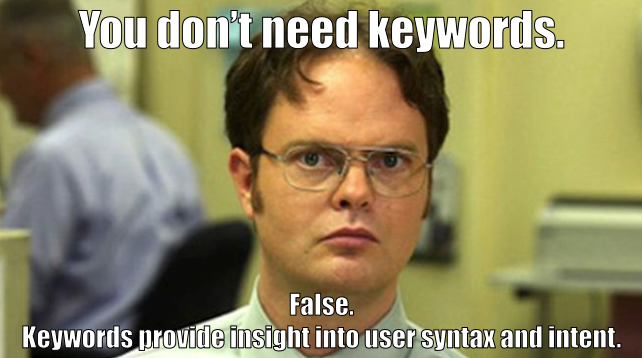
Keyword Syntax
How do people search for something? That’s what keywords are all about. It’s vital to ensuring your content will be found and resonate with your users.
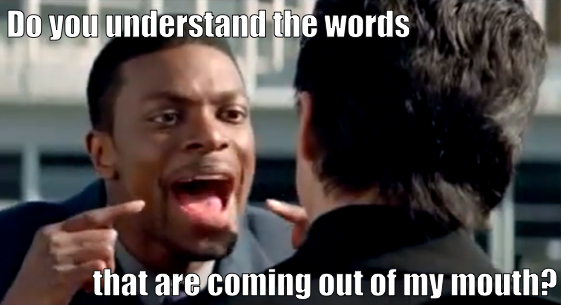
Are people searching for ‘all weather fluid displacement sculptures’ or ‘outdoor water fountains’. That’s an extreme example but it makes an important point.
You need to understand the user and the words they use to find your content.
Keyword Intent
Keywords can also tell you a lot about the intent of a search. Look (well) beyond informational, navigational and transactional intent and start thinking about how you can map keywords to the various stages of your site’s conversion funnel.
For instance, what does a query like ‘majestic seo vs open site explorer’ tell you? This user is probably further along in purchase funnel. They’re aware of their choices and may have even narrowed it down to these two options. The keyword (yes, keyword) ‘vs’ makes it clear that they’re looking for comparison data.
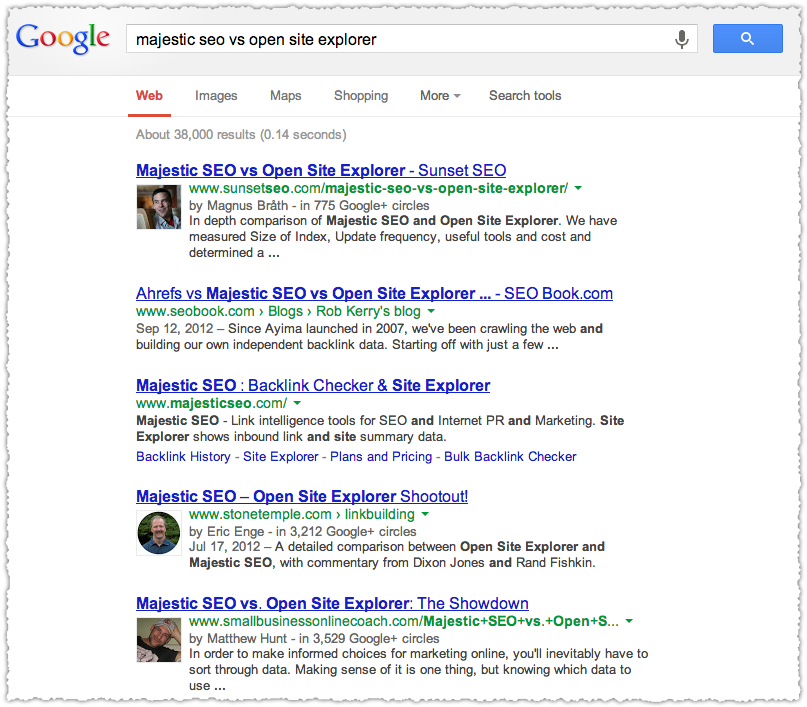
Sure enough, most of the results returned are posts that compare these two tools. Those pieces of content squarely meet that intent, in part because they’re paying attention to keywords.
Majestic SEO has a result but … it’s the home page. Is that going to satisfy the desire to compare? Probably not. And where’s SEOMoz? Missing in action.
Each could rely on the blog posts presented to deliver this comparison. Or they could also develop content that met that keyword and intent, allowing them to tell their story and frame the debate.
I know some will shriek, “Are you crazy? You don’t want to promote your competition by mentioning them so prominently!” But that’s denying reality. Users are searching with this syntax and intent.
Now, I’m not saying you have to put content that meets this particular intent prominently on the site or in the normal conversion flow. But if you know someone is on the fence and comparing products, why wouldn’t you want a chance to engage that user on your own terms?
Keywords let you create content that matches user intent.
Magic Questions
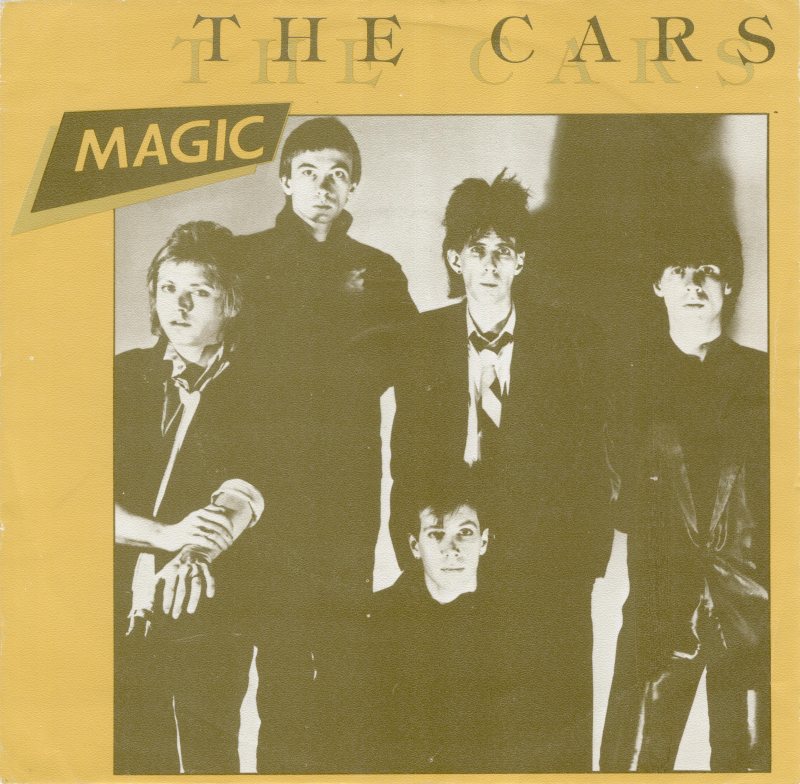
There’s also a lot of meta information that comes along with a keyword. I’m fond of using a term like ‘eureka 313a manual’ as an example. It’s a query for a vacuum cleaner manual.
On the one hand it’s a pretty simple. There’s explicit intent. Someone is looking for the manual to their vacuum cleaner. The content to meet that informational search would be … the manual. But, what’s really going on?
If you’re searching for the manual, odds are that something is wrong with your vacuum. There’s an implied intent at work. The vacuum is either not working right or is flat out broken. You have the opportunity to anticipate and answer magic questions.
How can I fix my vacuum? Where can I buy replacement parts? Are there repair shops near me? What vacuum should I get to replace this one if it can’t be fixed?
Be decoding the keyword you can create a relevant and valuable page that meets explicit and implied intent.
Keyword Frequency
Keyword frequency is important. Yes, really. One of my favorite examples of this is LinkedIn. How did they secure their place in the competitive ‘name’ query space?
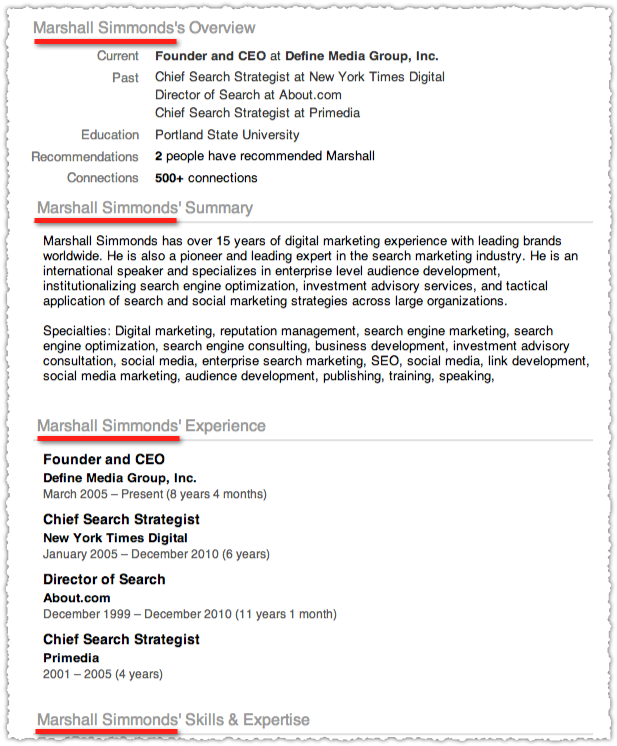
LinkedIn wanted to make it clear what (or who) these pages were about. That’s what keyword frequency is about, making it easy for search engines and users to understand what that page is about.
LinkedIn doesn’t just do it with their headers either, but uses the name frequently elsewhere on the page. The result?

There’s no question what this page is about.
Keywords are Steve Krug for Googlebot.
Readability

The reaction I get from many when I press on this issue is that it produces a poor user experience. Really? I’ve never heard anyone complain about LinkedIn and most never realize that it’s even going on.
Using the keywords people expect to see can only help make your content more readable, which is still a tremendously undervalued aspect of SEO. Because people scan text and rarely read word for word.
And what do you think they’re scanning for? What do you think is rattling around in their brain when they’re scanning your content? It’s not something random like ‘bellhop poodle duster’, it’s probably the keyword that brought them there.
You may think Google is smart enough to figure it out. You’ll claim that Google’s gotten far more sophisticated in the application of synonyms and topical modeling. And you’d be right to a degree. But why take the chance? Particularly since users crave the repetition and consistency.
They don’t want you to use four different ways to say the same thing and the hard truth is they’re probably only going to read one of those words anyway. You’ll create better content for users if you write for search engines.
Make sure you’re using the words users expect to see.
TL;DR
Keywords aren’t going away, they’re becoming more important. Query syntax and user intent are vital in producing relevant and valuable content that resonates with users and answers both explicit and implicit questions.
The Next Post: Crawl Optimization
The Previous Post: Google Removes Related Searches

12 trackbacks/pingbacks
Comments About Keywords Still Matter
// 47 comments so far.
David // June 05th 2013
There is a school of thought that if you understand your audience and the topic you are writing about, the article will naturally be keyword rich. I am somewhat of that school of thought. When I write content, I do not write around a keyword (unless a client is hiring me just to do that – sigh). But then, once the article is at its penultimate draft (or when I think it is), I will give some thought to keywords, and sometimes tweak the article accordingly.
AJ Kohn // June 05th 2013
David,
That’s somewhat similar to what I’d recommend, though it all depends on whether the writer truly understand how to write for the web. Ten sentence long paragraphs that produce a chunk of text or trying to cover too many things in one piece violate good writing overall and web writing in particular.
One of the things I teach is to go back and look for pronouns or leaps in logic. Those are the areas where both users and search engines could use help. Because you might use a pronoun but because the user scanned the piece they lose context.
Finally, I still believe it’s vital to understand what terms are going to bring someone to that piece of content. If you have a problem articulating that, it’s usually a red flag.
Scott // June 05th 2013
The anti-seo crowd is at it again. They get carried away with white hat seo and the next thing you know we are supposed to ignore user intent. It’s hard to turndown the noise on that kind of rubbish.
AJ Kohn // June 06th 2013
Scott,
I think people are carried away with ‘new’ SEO techniques and they forget that some of the old ones are worth saving and should be integrated and not left behind.
Ivan // June 05th 2013
Do you have any suggestions for keyword density? There has got to be a threshold where it becomes stuffing.
AJ Kohn // June 06th 2013
Ivan,
That’s a tough question. I never aim for a specific density. I simply want to know that the syntax I’m targeting show up prominently in the text. Obviously there’s a line and you don’t want to break natural language just to get another keyword phrase. So it’s both relative and highly dependent on the actual copy and how it flows.
Muralidharan Jayaram // June 05th 2013
I think the article you write needs to have keywords that people search. However trying to force fit keywords into what you write has the danger of your article turning out weird. What I am always confused about is how many keywords should be there for say 100 words? What is the ratio?
100 words = ?
200 words = ?
400 words = ?
Please do let me know!
AJ Kohn // June 06th 2013
Muralldharan,
There is no target ratio. It’s about relative frequency. Is the syntax you believe people are using well represented in comparison to other terms? Would someone looking at it very briefly be able to tell you what it was about?
Daniel Foley // June 06th 2013
I think this is a fantastic example of thinking outside of the box, but, I believe simply in writing as you would want others to perceive it, even if it’s partially neglectful of keyword coverage.
So many SEO’s / PR and Web Marketers spend their lives analysing and formulating, and sure enough it pays off when your content ranks well with the correct intent, but, I also think Google’s evolving algorithm will understand which is best when returning results.
My saying? you can please some people some of the time but you cant please everyone all the time
AJ Kohn // June 06th 2013
Daniel,
So if I wanted to refer to SEO as Flooflepuffery, if that’s how I wanted others to perceive it, then Google should figure that out?
I’m being absurd here, but the goal is to ensure your content reaches the right people and ignoring the syntax used to find it won’t help you reach that goal. This isn’t about analyzing and formulating, it’s about writing focused content for the web that is user centric.
Anthony Pensabene // June 06th 2013
makes me think a bit about sociology/anthropology, and the way groups use words in syntax. let’s take the concept of that ‘thing’ that changes the television channel from faraway.
I call it a ‘remote’ – may dad, a ‘clicker’ – my friend, a ‘mouse’
http://www.guardian.co.uk/uk/2008/jun/17/britishidentity
as more ‘things’ are offered/discussed on the webz, could be increasingly more important to categorize and label, reflecting your intended target’s syntactical behavior (part of user behavior/behaviours)
cheers, dude
AJ Kohn // June 06th 2013
Exactly Anthony! In this instance, if you had a device that helped older people change the television channel from far away (big buttons perhaps), then you might want to create content using the term ‘clicker’ instead of ‘remote’.
Keyword targeting is about creating user centric content.
Alan // June 06th 2013
Dangerous! This advice is hardly good, Google specifically tells Webmasters DO NOT stuff keywords. Write naturally, and be relevant. Don’t try to trick Google, they know what you’re doing. LinkedIn didn’t get to the top by keyword stuffing, they did it by being relevant.
AJ Kohn // June 06th 2013
Alan,
Did I say you should stuff keywords? No. Did I say not to write naturally? No. By using the syntax of your user you will be more relevant.
You are free to ignore my advice and carry on writing without a focus, without a user centric model that honors web reading behavior.
James Svoboda // June 06th 2013
Nice post AJ. It’s about time someone stand up for keywords! They get no respect I tell ya. 😉
IMHO, one of the important reasons for identifying Keywords to use, is that the ones discovered during the research phase can help to guide content. They can provide you additional with points of consideration. Sort of a yin and yang for creating balanced, well thought out content.
That is, as long as you don’t over do it with keywords, key words, key terms, key phrases, search terms, user queries, Google search words, keyword variations, key word repetition, or just plane keywords, keywords, keywords.
😉
AJ Kohn // June 06th 2013
Thanks James. You’re right. Sometimes doing the keyword research actually allows you to create a far more robust piece of content or a very powerful content series. I’ve taken to referring to it as syntax research, or intent research or even plain old user research but … the keywords are still at the center of all of that and will be until we’re communicating by ESP in 2157.
The problem with all of this is that it is all about nuance and most people … aren’t very nuanced.
Macario James // June 06th 2013
I love posts that have thorough user interaction, expanding the content at hand.
There truly is a magic, a skill even, with being able to craft keywords to one’s liking (what one would logically or initially think of, like in the case of the unique manual name) but at the same time making it search engine, well, really Google-, friendly.
MURALIDHARAN JAYARAM’s comment about a type of “golden ratio” for SEO keywords was something that I never thought of, but seems like it could/should matter. I’m glad it doesn’t, though.
The toeing of the line between stuffing keywords and a comfortable user experience with the example of LinkedIn is a prime example of what TO do versus what not to do. I will be using it as exhibit A for future instruction. I appreciate it. Thanks for this article!
MJames
http://www.searchinfluence.com/author/mjames/
AJ Kohn // June 06th 2013
Thanks Macario.
The line between overdoing it and making it comfortable is where most people get it wrong. For some (the article-spinning, make-money-fast SEO), they go way too far. For others (the UX designer who wants to delight the user), they don’t go far enough.
For the former, I’m not sure there’s much hope. For the latter, I tell them to go until they’re uncomfortable and then it’s probably just right.
Macario James // June 06th 2013
AJ
Sometimes the best way to learn is to be uncomfortable. Get out of your own fuzzy box!
John-Henry Scherck // June 06th 2013
Thanks for the SEO reality check 🙂
Whenever I do keyword research, I try and match up landing page to keyword intent and determine progress along the conversion funnel/customer journey. Keywords can provide amazing insight into a consumer’s mindset and should ideally influence your content strategy and UX from start to finish.
Also, I have a theory why so many people think “keywords” or “rankings” are dying:
They aren’t cool.
SEOs are trying to branch out and find their space/carve out their niche – all this nerd speak about keywords and rankings isn’t impressive – it’s often vague, filled with jargon and overly technical. It causes executives to get lost in the clouds and makes contracts not get signed (when presented improperly of course)
By dropping keywords (and rankings) from the conversation, we remove ourselves from KPIs and focus on just being “great” and providing “awesome content.” We promise fluff and are held responsible for fluff – which is what some SEOs want.
Rankings are metrics we can use to hold ourselves accountable, but asking for content changes and minor landing page tweaks and repeating terms like “unique content” and “linkable assets” gets old fast. We start sounding like broken records and decision makers stop listening.
In an effort to be taken more seriously, we’ve started to cast off the very thing we were brought in to do. Makes no sense to me…
AJ Kohn // June 06th 2013
Took the words out of my mouth John-Henry Scherck! Seriously, I wish I’d put some of that into the actual post.
Keywords are the foundation for a content strategy and UX. It’s as if people want to create music without understanding notes or melody.
When I think about it, the problem many SEOs have is that they’re unable to market their services appropriately. But perhaps that’s how it gets sorted out since good SEO is really just good marketing.
Those who are able to package, market and sell SEO wind up producing results and retaining clients. Because at the end of the day, results are what really matter.
Mike // June 06th 2013
Keywords are important, I agree, but I think the actual content revolving around those keywords is what will give you the best overall outcome. Keyword density is overrated, outdated, etc. In today’s SEO world, your content is what will take you to the top. If you’re reviewing a new Samsung TV, there is no need to mention (or stuff) the model 3 times every 100 words. Instead, write naturally about the features, what you like, what you don’t like, etc.
Just my 2 cents, but this has worked well for me in the days of Pandas, Penguins, and Pandas again!
AJ Kohn // June 06th 2013
Mike,
Like I said, there’s no actual density you’re trying to shoot for but simply knowing that the term needs to appear frequently enough in relation to other terms.
For example, “I love to watch the 49ers on this new TV. It has great picture quality and it’s better than the Sony Bravia. Here are the specs and details.”
Perfectly nice and natural right? But what TV am I talking about? I can make a piece of content better for the user and have it outperform non-targeted content simply by crushing pronouns and using the actual nouns instead.
Users want to see the keywords they’ve search for in your piece. Using their syntax and reflecting it back to them is user centric writing, because you’re not writing for yourself but for your audience.
Debajyoti Banerjee // June 09th 2013
Awesome in-depth post AJ. Agreed to your points but while writing content, I personally feel it’s the best to go with the natural flow. If you have done a good research, passionate & know your topic very well (The way you wrote here :)), rest will automatically come. At the time of final revision, you can just do a quick tweak for keywords.
AJ Kohn // June 09th 2013
Thanks Debajyoti.
I’d say that if you’re done your research and you understand the syntax of those who would be interested in that content, then that you can, as you say, go with the natural flow.
Then go back and find places where you’ve used a pronoun instead of a noun or simply dropped a phrase where it might make sense. I find the latter often crops up in subheads.
Magnus Bråth // June 11th 2013
I believe people are trying to move away from keywords for two reasons; it’s tough to do SEO when it gets competitive and it’s harder to measure with personal results and not provided-data. Top position on a global high value keyword can still make or break a business though.
Love the example for vs. 😉
Grant Simmons // June 12th 2013
Wrote an article back in January with my thoughts
“Keywords are Dead! Long Live Intent!”
http://searchenginewatch.com/article/2234448/Keywords-Are-Dead-Long-Live-User-Intent
There’s some hyperbole in the title for sure, *but* the primary point is that the term “keywords” is passive, and SEO folks need to look at both a query’s intent and potential context that refines the query, to better understand how to create content that connects with the query’s intent (and users context).
So keywords *kinda* matter *if* you look at them as intelligent queries not dumb words 🙂
Cheers
Christopher // June 17th 2013
Yes things are shifting more and more towards quality relevant content and less towards keyword density, but as you explained that doesn’t mean keywords are not still super important. Understanding which keyword phrases customers use to find you is very important when creating your content. The content doesn’t necessarily need the keyword phrase unnaturally inserted every so many sentences/paragraphs, or even at all for that matter. But it DOES need to compliment the keywords you’re matching it up with.
Sani // June 17th 2013
I just don’t see how people can think that keywords are not important. If you don’t use keywords how will people know what your site is about? I think people should realize that keywords are not the only thing that helps with SEO but that does not mean it is extinct.
Dave Langdale // June 19th 2013
Surely this keyword research should be done before content is created? Taking David’s point from the first comment, by writing on a particular topic, you’re naturally going to use a variety of phrases all on the same subject. But if that subject doesn’t have search volume then why are you writing about it?
I try and avoid using keywords to build my content up, but always attempt to ensure that whatever I’m involved in creating has an audience or answers a common question.
Less about keyword usage and more common sense though I would think.
Chris Stewart // June 20th 2013
Depends who the audience is… There should be a natural flow in writing, but not all “natural” conversations has a smooth flow of words.
Go talk to a geek at BUY.com and ask him for the specs on the 124d9 device… “Heres the Sony 124d9 model which is almost as good as the Sony 12ffg model , the 124d9 is blah blah” using some of the definitions of keyword stuffing he would be guilty of keyword stuffing … 🙂
Nick Stamoulis of Brick Marketing // June 24th 2013
Keywords are still an essential component of an SEO campaign. It’s recommended to write content naturally, but implement keywords where they fit. Search is still based on keywords. If your content doesn’t include the keywords that prospects are using to find information, it won’t be found in the SERP.
Patrick McCoy // June 25th 2013
We’ve been reading several articles on search engines migrating towards user intent rather than keywords, however, a lot of it is just voiced opinions. Great for them and feel they’ve accomplished the mission of creating confusion and mixing up the SEO pot some more. As if we don’t already have enough to learn and tweak for our campaigns. Keywords, and just my opinion, will still need to be a driving force in displayed search results. Unless Google and Bing become mind readers for your intent on what you think you want to view. Keywords will help users create intent. It is their intent to enter a phrase for a search result in order to select info to read, services to look up or purchase a product. This holds true to mobile and desktop users. We’re all searching for something, intentionally.
Grant Simmons // June 25th 2013
Nick
There’s certain caveats and exceptions… Search for “houses Miami” and Google includes “homes Miami” – some of the ranking pages have very few, if at all, mentions of the keyword “houses” – there’s many other examples of Google recommending like terms based on its “intent thesaurus”
Patrick
It’s not just opinion… Both Google & Bing have frequently noted intent & context as key connectors to index curation… And intent / context is key to determining what to show in SERP for universal / local vs list o links.
Search for “making maple syrup” vs “history of maple syrup” and the former returns some video results… Why? Because Google is guessing an intent that deserves video.
As I noted above… Keywords are still the primary methodology for searching, but SEO folks need to go beyond ‘dumb’ matching and think ‘intelligent’ intent & context of *queries* when creating & optimizing content / sites.
Cheers
Ankit Garg // June 25th 2013
I think the whole debate of keywords not being relevant anymore arises from the perspective of user experience. Some people assume that algorithm can be messed with keywords and hence there is natural progression from Keywords to Intent (which is much harder to hack).
But if keywords are used to design user centric content which gives him/her whatever he/she was looking for, then why should there be any fuss? And to a matter of fact, keywords should not be called “Keywords” but “user searches” which by mere name puts user at the center.
Aaron Bradley // June 27th 2013
A typically great post AJ – thanks!
Rather than rehash what I said here, just a pointer to a partial response about this over on Matthew’s Moz post:
http://bit.ly/11Q75SA
sid@bitts.co.in // July 04th 2013
It is true that keywords matter but to get a good rank in search engines there are other important strategies and tactics such as good and powerful content, content marketing in a proper way and lots more that need to be followed.
Zac // July 17th 2013
Very Interesting Post. Keywords are important, but other things matter most when it comes to ranking high on search engines. You could have the best keywords, but if you can’t rank high in Google, it won’t matter.
George // July 23rd 2013
I’m sorry but I just do not believe you want to use meta keywords any more.
AJ Kohn // July 24th 2013
I’m sorry George, but where in the post do I mention meta keywords?
Evgeniy // July 24th 2013
In my opinion, keywords aren’t so important, as earlier. Google declares new approach, from strings to things, but Schema.org doesn’t let us markup/extend keywords as Things, but just as a Text/string. This means for me the importance downgrading of the Keyword.
woodman // July 26th 2013
Keywords are still crucial in search. However I do feel that the best approach is to write your content with the reader’s needs 100% in mind.
Once you are happy with the copy then use a tool just as MOZ on page grader to check that the content you have written adequately captures the keywords that you want to be visible in.
Steven // July 26th 2013
It seems that Google search is completely divided in two different search results. One result shows only information and other included company websites where you can find the product or service selling industries. They are now trying to create a new culture in the keyword search algorithm. What i mean by that is, if you are searching for information about any product then use the product name and avoid words like “services”, “buy now”, “store” etc. If you search with the words “service” or ” buy now” keywords then you only see the result of product selling websites. There are many websites without quality content ranking high for the product search query. So whenever you are doing keyword research, I would recommend please take this in mind before finalizing keywords. It yo company is product selling then you will never rank high for the generic keyword term.
Jim // September 04th 2013
Thanks for the well thought-out article. The Majestic SEO vs Open Site Explorer made me think about one of my websites and how to add additional content to address visitors needs.
Thanks again
Asher Elran // September 13th 2013
You can’t staff your article with keywords and expect it to rank high. However keywords matter today as much as they were before. You need to be more creative and come up with variety of synonyms and have a low to average keyword density for your targeted keywords if you want your articles rank high.
Alexander Holl // October 04th 2013
I totally agree. I am currently doing some investigation on the hummingbird algo launch and you are pretty quickly coming to posts, where you could think keywording is a dead science. And it is not. Keywords are user intent
Thx
Alexander
Zibrasoft // October 25th 2013
For SEO obvious keywords will always matter, but with no keyword data in analytic lot of SEO are disappointed, but we can track it from Webmasters.
One thing more, people need to change the strategy while creating links on keywords. They need to target brands more now.
Sorry, comments for this entry are closed at this time.
You can follow any responses to this entry via its RSS comments feed.